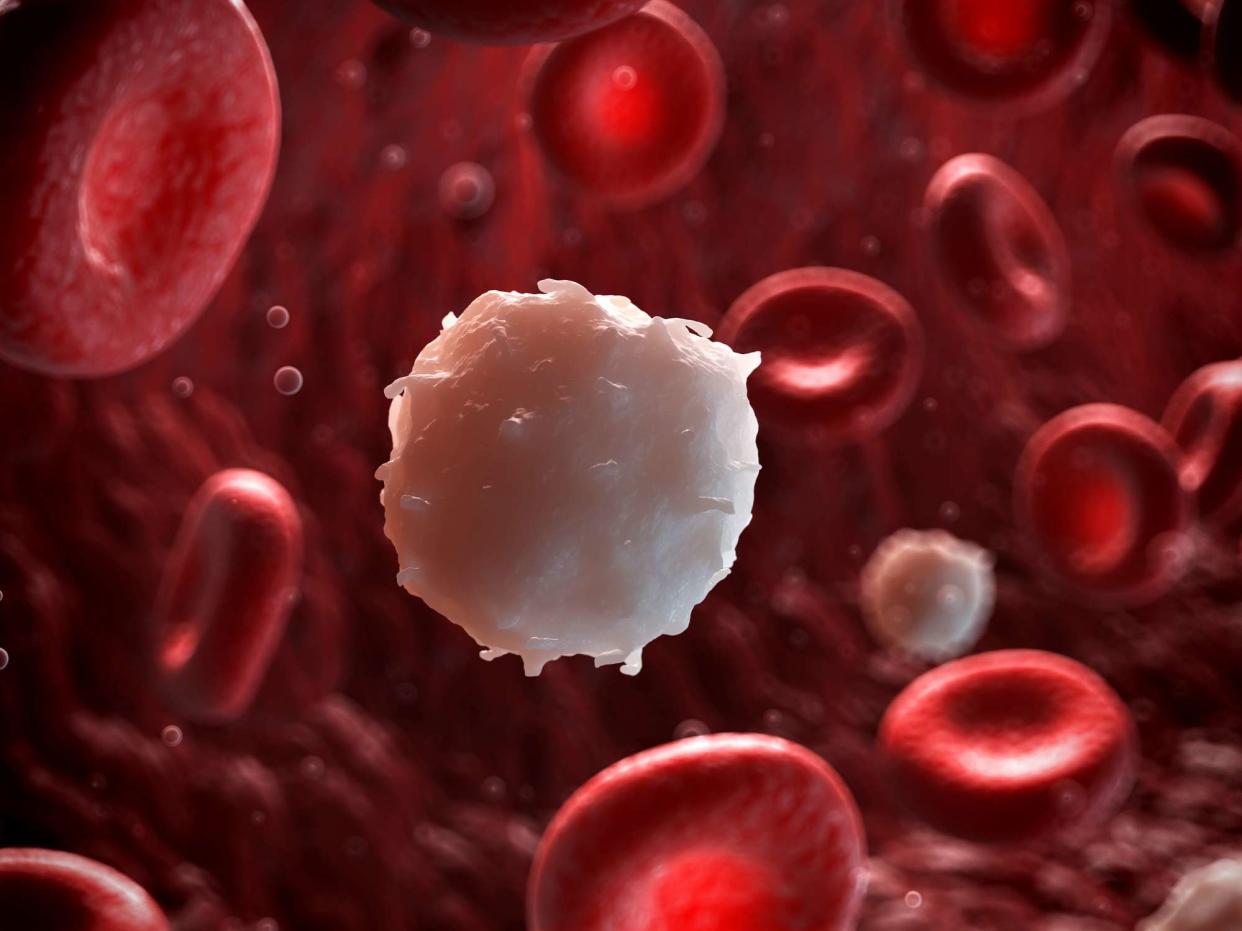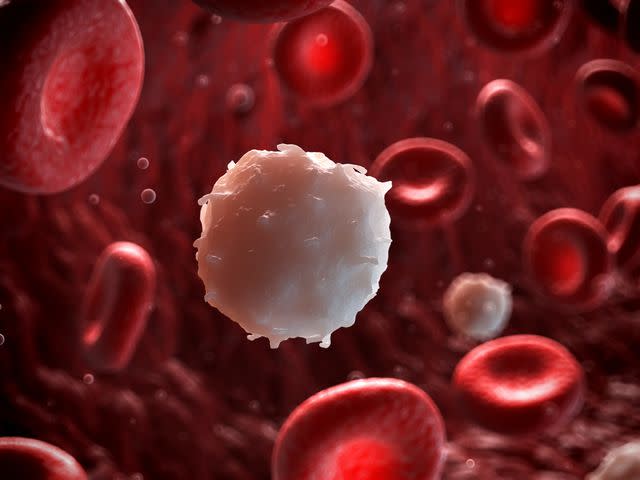How Can I Increase White Blood Cells?

Getty Images
Medically reviewed by Steffini Stalos, DO
You can increase white blood cells (WBCs) by taking certain medications and eating immune-boosting foods. Maintaining a normal level of healthy white blood cells can help reduce the risk of infection and is a key component of overall health. If you have a low WBC count, called leukopenia, you may be at an increased risk of developing infections.
This article discusses the function of white blood cells, the causes of increased and decreased white blood cell counts, and the medications and foods that can help you maintain a healthy white blood cell count.

SEBASTIAN KAULITZKI / Getty Images
What Are White Blood Cells and Their Function?
WBCs help protect you against illness and infection. When your body is exposed to disease-causing pathogens like viruses or bacteria, white blood cells are sent to destroy the invaders and prevent or shorten illness.
White blood cells also help your body fight cancer. Since cancer cells are foreign to the body, white blood cells such as lymphocytes can help eliminate cancer cells.
Some cancers can evade detection by the immune system. Still, medical advances have created new therapies and treatments that use white blood cells to detect and target cancer, such as checkpoint inhibitors and cell therapies.
Several types of white blood cells are found in your body, each with specialized functions.
Neutrophils: Neutrophils make up the majority of the white blood cell population. Neutrophils are the primary cells responsible for responding to bacterial infections.
Lymphocytes: Lymphocytes are the second most common white blood cell subtype. Lymphocytes include T cells and B cells, which help support the immune system's response to infections, cancers, and other stresses.
Eosinophils: Eosinophils are white blood cells primarily responsible for allergies and responding to parasitic infections.
Monocytes: Monocytes are the first to respond to an infection. These blood cells include macrophages and dendritic cells and can be elevated in autoimmune disorders and chronic diseases.
The white blood cell count is a measure of the body’s immune system. When the white blood cell count is high, it is a sign that the body is under stress, and there may be an infection, injury, or other stressors on the body.
What Causes High White Blood Cell Counts?
Importantly, you don't want extremely high levels of white blood cells. Increased WBC levels—known as leukocytosis—indicate the body is responding to a stressor. Stressors that increase WBC levels can be physical, such as an infection, cancer, or autoimmune disorder, or emotional.
There are many causes of elevated WBC counts, including:
Infection
Medications, particularly steroid medications
Pregnancy
Surgery or injury
Allergic reaction
Autoimmune disorders
Stress, both emotional and physical
Bone marrow disorder
Smoking
The most common test to detect WBC levels is with a complete blood count or CBC. The CBC can provide information on the total number of white blood cells in the body and the specific types of white blood cells.
Another test that is used for white blood cell assessment is called flow cytometry. This more advanced test is typically used for evaluating cancerous white blood cell counts.
What Causes Low White Blood Cell Counts?
While many conditions can lead to high white blood cell counts, there are only a few major causes of low white blood cell counts, most of them medication side effects. These causes include:
Chemotherapy medications
Immunosuppressive medicines
Arsenicals
Barbiturates
Bone marrow failure
Autoimmune disorders
If you have a low white blood cell count, you should ask your healthcare provider to determine the cause and the best course of treatment. A very low white blood cell count can sometimes increase your risk of developing serious infections.
Can Medicine Increase White Blood Cells?
A healthcare provider may prescribe medications to stimulate white blood cell production if you have a low white blood cell count. These medications, such as Neupogen (filgrastim), Neulasta (pegfilgrastim), and others, are all part of a family of drugs called granulocyte colony stimulators (G-CSF). These medications jump-start the bone marrow to produce more white blood cells.
Related:What Are Bone Marrow Stimulators Used For?
What Foods Boost White Blood Cells?
If your white blood cell level is low, you can make changes to try to increase it. Always consult a healthcare professional before starting new treatments, including diets, that may disrupt your WBC count. Very low WBCs are medical emergencies that require prompt treatment.
A healthy diet rich in vegetables and protein is an excellent way to maintain a healthy immune system. The following foods may even help increase white blood cells:
Fish: The omega-3 fatty acids in fish are good for white blood cells.
Yogurt: Probiotics and protein in yogurt are good for building white blood cells.
Lean protein: Lean meats contain zinc, which increases white blood cells.
Vegetables: Antioxidant-rich veggies are great for your immune system.
Nuts: Nuts pack an immune-boosting punch with antioxidants, zinc, and protein.
Berries: These fruits contain flavonoids, which increase white blood cells.
Garlic: This little bulb may give your immune system a boost.
Further, a Mediterranean diet—which consists of whole grains, fruits and vegetables, beans, nuts and seeds, healthy fats, moderate amounts of fish and poultry, and limited amounts of red meat—has been shown to help boost white blood cell levels.
Foods such as blueberries, strawberries, and leafy green vegetables can help reduce the risk of developing certain immune disorders. In addition, these whole foods are a good source of antioxidants, which can help support the function of a healthy immune system.
As much as possible, get your nutrients and antioxidants from foods. However, you should consult with a healthcare professional before starting any supplements.
Related:'Food Is Medicine': When Fruits and Vegetables Become Part of a Prescription
Summary
Maintaining a healthy white blood cell count can help reduce the risk of infection and is a critical component of overall health. If you have a low WBC count, you may have leukopenia, which increases your risk of developing infections.
If you have a low white blood cell count, there are several strategies you can use to boost your white blood cell levels. Work with your healthcare provider to see if medication changes or diet can help increase your levels.

